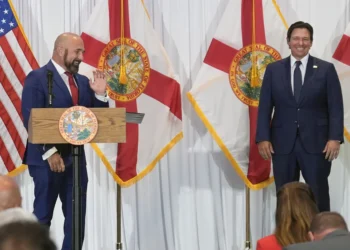President Trump announced on Truth Social last week his intention to sign an executive order banning mail-in voting ahead of the 2026 election. For those who care about ensuring our elections are safe, secure, and transparent, this is welcome news.
The reality is that mail-in voting is the least secure method of casting a ballot in the United States. Unlike in-person voting, where safeguards such as voter ID verification are standard and supported by a majority of the people, mail-in ballots are susceptible to fraud, misdelivery, and errors. Ballots can be intercepted and fraudulently cast, lost in transit, or even altered without the voter’s knowledge. In addition, signature verification — a key safeguard — is far from foolproof.
States that have widely implemented mail-in voting, such as California, Nevada, and Colorado, have experienced chronic delays in counting ballots, sometimes taking days or even weeks to finalize results. These delays create uncertainty, undermine public confidence, and provide fertile ground for disputes and legal challenges.
For instance, in California, it took 38 days after the November election to certify the results, with about 81 percent of the votes being by mail. In Nevada, mail ballots sent by Election Day can still be counted if they arrive up to four days afterward, a rule that extended the timeline for final results in 2020. Colorado has also faced hurdles with mail-in voting, prompting U.S. senators to urge the U.S. Postal Service to ensure the timely delivery of mail-in ballots.
Battleground states such as Pennsylvania, Michigan, and Wisconsin have also encountered significant challenges with mail-in voting. In Pennsylvania, last-minute changes and a surge in mail-in voting during the 2020 election caused extended deadlines and legal challenges regarding ballot receipt and counting procedures that lasted years.
Similarly, Michigan experienced delays in counting mail-in ballots, and Wisconsin had issues with absentee ballot verification and processing, leading to concerns about the accuracy and integrity of the vote count.
Democrats, however, have increasingly weaponized mail-in voting as a tool to influence election outcomes. By pushing expansive mail-in voting programs without sufficient safeguards, they have created opportunities for procedural confusion, ballot mishandling, and, in some instances, outright fraud. These actions do not promote access; rather, they erode trust in our electoral system and disproportionately affect competitive races where even a small number of disputed ballots can change outcomes.
The case for banning mail-in voting is clear. Elections must be secure, transparent, and fair. While convenience is important, it can never come at the expense of integrity. In-person voting, with proper identification and procedural safeguards, ensures every vote is legitimate, every voter is verified, and the results are beyond reproach.
President Trump’s executive order would be a bold step toward restoring confidence in our elections. By taking action to ban mail-in voting, he would not only protect the integrity of the vote but also send a clear message: Election integrity matters. Americans deserve to know that when they cast their ballot, it will be counted accurately and fairly — without interference, delay, or doubt.
As we look toward 2026, Trump’s commitment to secure elections is pivotal. Banning mail-in voting is not about restricting access; it is about ensuring that every vote is real, every outcome is legitimate, and our self-government remains protected. For the sake of election integrity and the future of our nation, this is a fight worth supporting.
Josh Findlay is the director of the Texas Public Policy Foundation’s National Election Protection Project and the former national director of election integrity for the Republican National Committee.
















